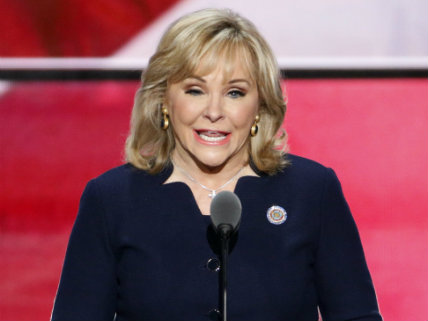Oklahoma Governor Wants Scrutiny of 'Unnecessary and Burdensome' Licensing
The wheels of reform turn slowly. No action expected until 2018.

Policymakers in Oklahoma are undertaking a review of the state's occupational licensing laws to determine whether they are protecting the general public or creating a barrier for workers.
Gov. Mary Fallin announced the initiative on Tuesday. All licenses in the state will be scrutinized by a task force that includes state lawmakers, the attorney general, the head of the state's labor commission and several members of the state's business community.
"These unnecessary or outdated barriers make it hard for many Oklahomans, particularly those who may not have completed a formal education as well as some minorities," Fallin said in a statement.
There's a growing bipartisan consensus that mandatory government permission slips are bad for individuals and for the economy as a whole. When they don't do anything to protect the public's health or safety, licensing laws generally restrict entrepreneurial opportunities and drive-up costs for consumers. Conservative and free market groups like the Heritage Foundation, the Cato Institute and the Reason Foundation (which publishes this blog) have been taking for years about the need to reform licensing laws. They're joined by left-of-center groups like the Brookings Institution and the ACLU. Even the Obama White House last year published a report detailing how licensing limits individual opportunity and economic growth.
More than one-third of all jobs in the United States is now subject to some form of licensing, up from just one in 10 jobs in 1970, acording to research by Morris Kleiner at the University of Minnesota.
Oklahoma joins Wisconsin on the list of the states that have promised to make licensing reform a priority in 2017—though in Oklahoma's case, nothing is likely to happen until at least 2018. Fallin's task force isn't required to submit a final report until next December, at which point the legislature will decide whether to follow the group's recommendations.
They shouldn't have to look very hard to find questionable licensing laws. A 2012 study by the Institute for Justice, a libertarian law firm that challenges onerous licensing rules, found that Oklahoma had the 11th most burdensome licensing laws among the 50 states. On average, it takes 416 days—more than a year—of training to get an occupational license in Oklahoma, though the requirements range widely from license to license.
Perhaps the oddest permission slip handed out by Oklahoma's state government is the mandatory social and human services assistant license (something only six other states require, according to the IJ report). It takes more than 2,100 days of schooling to get that license.
Oklahoma also requires licenses for barbers, makeup artists, cosmetologists and skin care specialists. Beautician licenses like those have come under fire in other states for being nakedly protectionist measures that limit competition and increase costs. Becoming a barber or cosmetologist in Oklahoma requires 350 days of training and passing two exams.
"While we need to be judicious in identifying potential licensing issues for reform, we also need to consider how removing barriers for Oklahoma workers could fundamentally strengthen our state's economy through increased opportunity for tens of thousands of Oklahomans," said John Tidwell, director of the Oklahoma chapter of Americans for Prosperity, a free market group that cheered Fallin's announcement.


Show Comments (30)